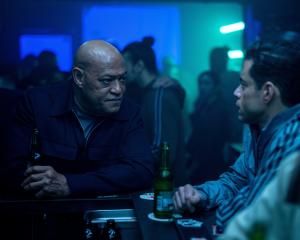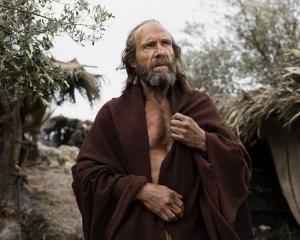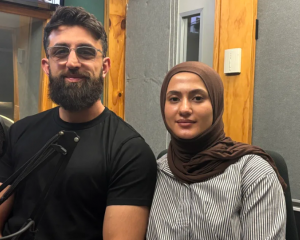Sam Hunt has found himself a nice sunny spot in his house overlooking Kaipara Harbour, northwest of Auckland. He has also located a bottle of pear cider and is thus ready to talk.
And, boy, can he talk.
The first subject is a feature-length film documentary, Sam Hunt: Purple Balloon and Other Stories. An engaging examination of Hunt's influences and excesses, it peels back the layers of his life via interviews with the man himself and various commentators, friends and family members.
Given Hunt is portrayed as a very private person by a range of friends, the first question put to him is how he feels about having his existence scrutinised in such detail.
"It was done very much on my terms. It's not that the story they told was what I decided should be told, but mutual trust was most important," says Hunt, his familiar gravelly drawl spilling down the phone.
"I've only just watched it properly, from one end to the other. I did so quite objectively - if one can be objective about these things - and I thought they'd done a very honest job. There are good doses of humanity there as well as humour."
Less than a week after the film opens on general release nationwide, Hunt will publish a new collection, Chords And Other Poems, following 2008's Doubtless.
The "chords" to which the title refers are a loosely connected group of poems that Hunt likens to a musical score; they are stripped-back compared to those comprising the second half of the collection.
Themes range from ageing (Hunt is 64), the ebb and flow of relationships (The Oxford Companion To New Zealand Literature describes Hunt as an unabashed romantic) and celebration (including a series of "runes" to his 13-year-old son, Alf; he has another, Tom, who is in his mid-30s).
"Alf came to live with me about three years ago full-time - he's always been with me a lot of the time but the domestic arrangement was that I became main caregiver. It's great. I love it. I get up at 6am and make the school lunch, do all that stuff. I love being a dad.
"I don't go off on long tours now. I used to be away for months or years, but now I do two or three shows every two or three weeks and that suits me.
"I sometimes take Alf on tour with me but not on stage, though with his guitar ..." he trails off, possibly considering some accompaniment potential a la David Kilgour and the Heavy Eights' 2009 project, Falling Debris, in which the Dunedin musicians put music to Hunt's words (although he didn't sing; Kilgour did). The group's recent album Left By Soft also features music that appears on the documentary.
Hunt likes songs, all sorts of them. Proof can be found in the musicality of his delivery, despite older brother Stephen claiming Hunt is tone deaf.
"Well, he's right. I used to be but I'm not now. I'd always been told I was."
It is correct, however, that he didn't speak until he was 4.
"I didn't have any words and I know what it is like since. There are times when you have no words or you don't know how to say something - more often the latter."
He has also struggled with a stutter most of his life ("Sometimes, especially if I answer the phone and I'm trying to say hello and I can't get round the 'h' ..."), although he believes he probably wouldn't have written a poem had he not stuttered.
"I would strongly suspect there is a connection with the inability to say or find the word. It's almost like the resistance becomes the catalyst."
Hunt says it's important he listens to the sound of his heart beating, to measure his emotional pulse, in order to best channel an idea or flow of words.
"I've spent a large amount of my time checking out the silent places. For me, that is important. That is cherished. I won't say I've put that in front of everything in my life, but I've put it in front of a number of things."
That contemplative ability has a flip side, a tipping point. In Hunt's case, this means getting drunk. He talks of living 40 years "on a narrow ledge", of periods of being sober and "being pissed", of enjoying hangovers. In Titirangi a few years ago, he was too drunk to recite.
Asked to explain what drives such behaviour, Hunt's response is preceded by the slightest of pauses: "Yeah ... um ... ah, that's a hard one to answer. I think it's just by sheer good luck you make it back to the other side ... sometimes you just need a break from yourself."
Burns Fellow at the University of Otago in 1975, Hunt was awarded a QSM in 1986 for his contribution to New Zealand poetry and last year was made a Companion of the New Zealand Order of Merit. He has published more than 15 collections, performed in Australia and the United States and, all the while, travelled up and down New Zealand telling stories and imbibing them.
Intrinsic to Hunt's work and a prime reason for its wide popularity - he is one poet who can pack out a rural pub on a weeknight - is the energy he imparts in the delivery of his words. Hunt says he hears poems before he writes them; in fact, often he only writes them down in order to better remember them.
"I've got to hear the sound of the poem. I'm very happy to be publishing the book but that is the 'score' of the poem, the written-down version. It's not its 'told' version.
"An old road-code for me has been: tell the story, tell it true, charm it crazy.
"I've lived with my poems since I was 21 years old. I'm 64 now. Or, as my son Alf says, I'm eight squared."
• The film, the book
Sam Hunt: Purple Balloon and Other Stories opens at Metropolis, Dunedin, on Thursday, May 26, and Rialto Cinemas on June 9.
Chords And Other Poems (Craig Potton Publishing) is published on June 1.













